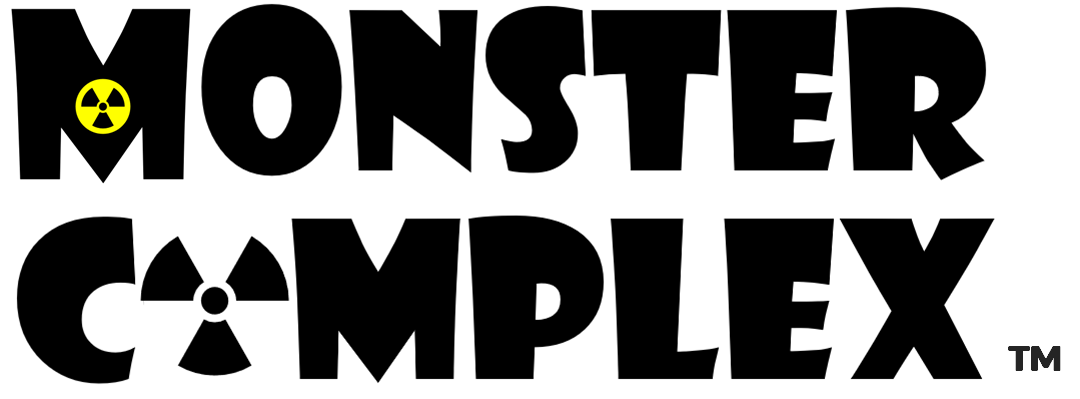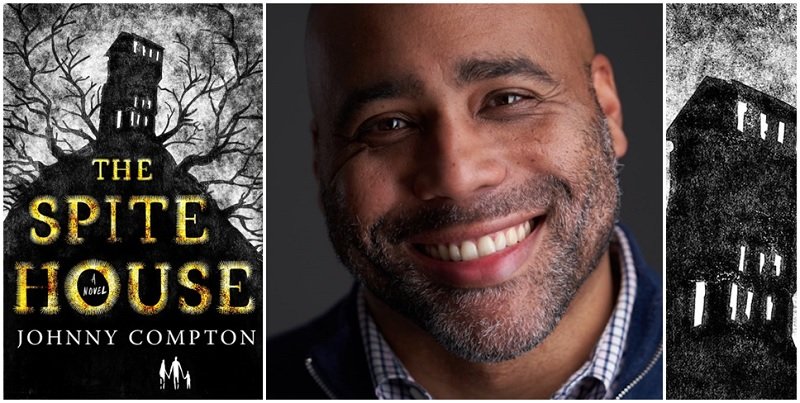Q&A: Johnny Compton on ‘The Spite House’: “Someone building a house purely to express their hatred fascinated me.”
A terrifying Gothic thriller about grief and death and the depths of a father’s love.
We talk to horror author Johnny Compton about his stunning debut—The Spite House has been called “The Babadook meets A Head Full of Ghosts in Texas Hill Country.”
In our interview with author Johnny Compton, the author talks to Monster Complex about The Spite House, shares the angle that drove him to write it, explains his favorite things about horror fiction, and reveals how he hates it when people dismiss the genre.
Monster Complex uses Amazon affiliate links.
About the book
In The Spite House, Eric Ross is on the run from a mysterious past with his two daughters in tow. Having left his wife, his house, his whole life behind in Maryland, he's desperate for money—it’s not easy to find steady, safe work when you can’t provide references, you can't stay in one place for long, and you're paranoid that your past is creeping back up on you.
When he comes across the strange ad for the Masson House in Degener, Texas, Eric thinks they may have finally caught a lucky break. The Masson property, notorious for being one of the most haunted places in Texas, needs a caretaker of sorts.
The owner is looking for proof of paranormal activity. All they need to do is stay in the house and keep a detailed record of everything that happens there. Provided the house’s horrors don’t drive them all mad, like the caretakers before them.
The job calls to Eric, not just because there's a huge payout if they can make it through, but because he wants to explore the secrets of the spite house. If it is indeed haunted, maybe it'll help him understand the uncanny power that clings to his family, driving them from town to town, making them afraid to stop running.
The Spite House
Johnny Compton
Tor Nightfire
Categories: Ghost Fiction, Gothic Fiction, Horror
Find The Spite House on Amazon
Reviews:
“With his debut novel, Compton tackles our universal need to understand our past with this ghastly ghost story, cranking the dread to a fever pitch.”
(ThisIsHorror.com)“The Spite House is an aching, heartbroken meditation on what haunts us and the sins we inherit from those who came before us.”
(Cassandra Khaw, author of Nothing But Blackened Teeth)“Johnny Compton’s The Spite House is the modern Gothic story full of dread we’ve all been waiting for. This strange house, perched on a hill and full of terrifying sounds and shadows that come out at night, will steal a part of you and never give it back.”
(Cynthia Pelayo, Bram Stoker Award-nominated author of Children of Chicago)
About the Author
Johnny Compton is a San Antonio-based author whose fascination with frightening fiction started when his kindergarten teacher played a record of the classic ghost story “The Golden Arm” for her class.
His short stories have appeared in several publications since 2006, including Pseudopod, Strange Horizons and The No Sleep Podcast. He is a Horror Writers Association member and operates the podcast Healthy Fears, which covers how our fears are explored through horror fiction.
The Spite House is his debut novel through Tor Nightfire.
Interview with Johnny Compton about The Spite House
Q: What inspired your book Spite House? Was there a particular hook or angle driving you to write it?
I had a haunted house story involving curse elements in mind, and then I came across an article about spite houses. The idea of someone building a house purely to agitate someone, or to express their anger and even hatred toward someone or something, fascinated me.
It also felt like a great setting for a haunted house story given the negative emotions required to actually build such a place. From there I looked at how well the concept of spite houses fit with my existing idea and thought they matched perfectly.
Q: What inspires your unique angle for writing horror? (How are you different or compare with other authors?)
Blogger Will Erickson coined the phrase “heartbreak horror” (at least I’ve encountered that term elsewhere) and I feel like it aptly describes my general take on horror, which isn’t exactly unique, and doesn’t encompass everything I’ve ever written, but I do like to explore the emotional weight of the horrific in my stories.
I also appreciate it when you see it with other authors and creators, of course, especially when it appears in potentially unexpected places. I might tend to dwell on it a bit more than maybe most readers and watchers of horror do, even when it's only present briefly.
For example, when I rewatch and think of the film Scream, which is understandably most famous for its effective brutality and, of course, self-aware humor, I tend to remember the moment when Casey Becker’s dying gasps are heard by her confused, alarmed and helpless parents over the phone. Craven treats it as a serious moment, devoid of any humor or irony present in some of the other death scenes, and even the musical score, for a handful of seconds, is meant to heighten the drama and emphasize the sadness of the moment as much as heighten the terror.
I still wonder about the Beckers and how they might have tried to carry on in that fictional universe, given the attention paid to their panic and trauma in that scene, which I imagine (though I could be wrong) isn't something most other people who’ve seen the film think much about, and I think that reflects my gravitation towards “heartbreak” within the horror genre, whether I'm reading, watching, or writing it.
Q: What are your favorite things about horror fiction?
Probably my favorite thing overall is the ability to scare, thrill, and/or captivate people while also fashioning a strange, living history. So much horror relies on past events coming back in some way to terrorize people in the present. I love a good horror story that also incorporates some sense or element of history, whether or not it's the centerpiece of the story, or be it genuine history, more folkloric and mysterious, or entirely fictionalized.
The work of Alma Katsu immediately comes to mind, of course, but also Tananarive Due’s Joplin’s Ghost, John Langan’s The Fisherman, Celso Hurtado’s The Ghost Tracks and so, so many others.
Hell, even my two favorite films from my favorite horror director, John Carpenter, engage with this to different degrees. Halloween doesn’t go very far back into its town’s history, obviously, but Haddonfield’s ignored past is what comes back to figuratively haunt it, and Carpenter deliberately treats the old, empty Myers house like it’s haunted by its bad history.
And, of course, The Fog is even more explicitly about a secret history being the source of a small town’s present horrors. The Thing is probably Carpenter’s best film, in my opinion, and I love it dearly, but I love Halloween and The Fog just the slightest bit more because they incorporate my favorite thing that the genre can do.
Q: What are some of your pet peeves with this genre that you’ve seen others do? (Books, movies, TV, whatever)
My biggest pet peeve related to the genre is whenever someone tries to deny that a story belongs to the horror genre primarily because it’s too popular, or is receiving too much critical acclaim. For instance, this rather bizarrely and frustratingly happened with the release of It in 2017.
It’s possibly even more irksome to me when other horror fans do it. I recall a few people who have an apparently very narrow view of the genre pushing back against Hereditary as being a sort of “horror story made by someone who didn’t want to make a horror story,” and even though that was a minority opinion it still bothered me like few things can.
Granted, I tend to cast an rather wide net when I’m determining which works I would or wouldn’t consider horror. But in some cases it’s pretty obvious that other people are trying to exclude a work from the genre (or exclude the genre from the work), either because they think anything of a certain quality or level of cultural impact can’t be “mere” horror, or due to misguided gatekeeping.
Q: What are the best ways that readers can connect with you or keep up with your author news?
JohnnyCompton.com, and my Instagram and Twitter handles are both “comptonwrites,” though I tend to be more present on the former than the latter.
More about Johnny Compton online
More author interviews from Monster Complex
Alma Katsu on THE FERVOR: “Horror is very truthful. Terrible things happen in real life.”
Charlaine Harris Q&A + True Blood / Sookie Stackhouse Books In Order
Zombie Q&A—Isaac Marion: “George Romero tried to touch on the humanity of the zombies.”
Horror Q&A with Author K.T. Rose (The Haunting of Gallagher Hotel)
Kendare Blake Q&A: ‘In Every Generation’ Revisits Buffy the Vampire Slayer
Zombie Q&A—Jonathan Maberry: “Zombie Stories Are Not About Zombies”
Panel: Black Women Who Write Dark Fiction and Poetry [Video]
More great horror fiction articles on Monster Complex
Monster Mash: 13 Movies Where Frankenstein Meets Dracula Meets The Wolf Man
60+ Special Vampire Book Series—from Anne Rice, L.A. Banks, Charlaine Harris, more
‘What We Do in the Shadows’ Fans—16 Vampire Books You Should Check Out
Quiz: Was That Monster On An Episode Of X-Files Or Buffy The Vampire Slayer?
25+ Indian Authors Who Write Science Fiction, Horror, and Urban Fantasy



